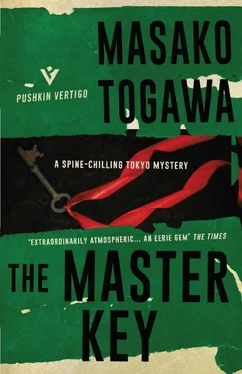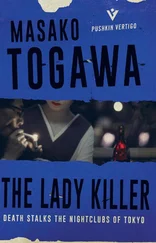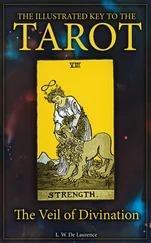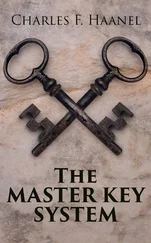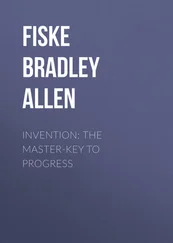I do not believe in the supernatural or in any Divine Being. So when I decided that a few fake miracles would be the best form of publicity for my brother’s religious business, I had no feelings of guilt on the matter.
I also felt that I could kill two birds with one stone. The best way to bring about the discovery of the child buried under the bath would be by way of ‘miraculous’ prophecy from the Three Spirit Faith.
So the trick I played on my colleague Miss Tamura—the phone call which led her to investigate Toyoko Munekata’s apartment and discover the meaninglessness of her scholarship—was, like the ‘miracle’ of Miss Yatabe’s violin, just a means to an end. My real objectives were to reveal the buried child and to do so by way of my brother’s prophecies.
I realised that it would look suspicious if the Three Spirit Faith were to make a prophecy and then soon discover where the child was buried. It would be much better to use the prophecy to attract some other person’s interest so that that other person could be led to discover the body for herself. That way, nobody would doubt the genuine nature of the prophecy.
And, because I knew the secrets of everyone in the building, it should be a simple matter to select the right person for my purpose and lead her, without her knowing, to the discovery I wanted her to make at the right time.
As far as Miss Tamura was concerned, all I had to do was to get my brother to call from outside and drop the hint about Miss Munekata’s secret. Being of a good-natured disposition, Miss Tamura would hate having to conceal the phone call, and yet would be equally unwilling to reveal its content until she was sure of the matter for herself. It would then only be a matter of time, I reasoned, before she would use the master key to get into Toyoko’s room. Where she slipped up, and my calculations went wrong, was that she left the master key in the lock of Noriko Ishiyama’s room instead of returning it to the office. (She thought I was out at the public bathhouse, but in fact I returned early and observed her coming out of Toyoko Munekata’s room.)
As my intention had been to spread a feeling of uncertainty around by having her use the master key to go into people’s apartments, her mistake in fact served my purpose. But the pains I had to take to get Noriko Ishiyama to use the key were more than you can imagine. I had to devise a way of getting the old newspaper, which I had originally come across in the deceased receptionist’s room, describing the theft of the violin into Miss Ishiyama’s hands. Then I had to invent a foreigner who came enquiring for a copy of the paper. It was all but impossible, but my plan worked. Then I was lucky enough to spot Noriko Ishiyama hiding the stolen violin in the incinerator, and so could recover it. (Needless to say, I substituted for it an instrument I bought in a junk shop, which I put into the real case.) This meant that I could bring about the ‘miracle’ of Suwa Yatabe’s violin, but in the end this led to the tragedy of her death, which I much regret.
I must confess that when Miss Yatabe’s finger straightened out after the medium had told her that André Dore formally bequeathed the violin to her, I began to believe in miracles myself. However, when my brother, in order to gain more publicity for the ‘miracle’, went too far and told her to turn herself over to the police and to return the violin to André Dore’s son, her face changed colour suddenly and she screamed: ‘He had no son. It was you and your fellow conspirators who wrote that fake letter from a foreigner to me.’
Well, that led to us having to push her off the rooftop. By ‘us’ I refer to the medium and Haru Santo. Of course, as you must by now have realised, Haru Santo was me in my other guise. As I wanted to keep an eye on Chikako Ueda, I waited till the room next to her fell vacant, and then Haru Santo moved in. I registered her name and made out the rental agreement in my official capacity.
So for five years, wearing a white wig, I lived part of every day in the role of Haru Santo. Every evening I would peep in through Chikako Ueda’s window. I rigged up a wing mirror from a car on a stick so that I could see what was going on. Every night, she would open the little drawer she always kept locked, take out a cardboard box and gaze at its contents for hours on end. I took it for granted that this was the three hundred thousand yen ransom for George—well, for once I was made to look a perfect fool! For it turned out that the box contained a certificate of marriage registration, duly sealed, which would acquire the full force of law merely by being delivered to the ward office. I just can’t imagine how anyone could spend her evenings for seven years looking at a marriage certificate left behind by some man who had abandoned her, but that’s what women are like, I suppose.
Well, in the same way the little medium Thumbelina loves my brother, and it was out of love for him that she was my accomplice in the murder of Suwa Yatabe. She was not actually present, but she lured Suwa to her death by telling her to come to the rooftop at eleven pm and promising to return the violin to her. Suwa, thinking that it was only little Thumbelina she had to contend with, lowered her guard enough for me to push her over the edge.
I had made allowances for someone seeing Suwa going onto the roof and following her there, as indeed Yoneko Kimura did. First of all, I had taken a thick bamboo pole (one of the ones used for drying laundry) and lashed it to the railings so that it led down to Haru Santo’s windowsill. I was thus able to make good my escape, and later on I replaced the pole where I had found it. Also, in order to cover Suwa’s screams as she fell, I had brought with me a tape of her playing the violin, and played it at the right moment.
All well and good as far as it went, but I never intended to become a murderess. I detest such things, and getting into the position where I had to kill Suwa Yatabe was my big mistake—in the case of Toyoko Munekata, I had no intention of killing her, and indeed she survived the gassing. I just wanted to punish her for her overwhelming pride, and saw my opportunity when she descended on me the day before, berating me in her usual haughty manner because her fanlight window wouldn’t shut. So I knew perfectly well that if I turned off the gas from outside and then turned it on again, I could teach her a good lesson but without fatal consequences.
I pretended not to notice when Yoneko Kimura switched the master key, and I think my plans there went off very well. You see, Miss Kimura stood apart from all the others, being much more intelligent than the average and also possessed of abundant common sense. A person just like me, in fact, and so it was very easy for me to foresee how she would react to any given occurrence and make my dispositions accordingly. So I made sure that by one means or another she got to know everything that I knew about Chikako Ueda. For instance, I had witnessed the burial in the bathroom, but could by no means impart that directly, so instead I just wrote that elegy and left it in Chikako Ueda’s room for Yoneko to read. Then I made sure she would hear the right things from the medium, and that she would get the chance to see the register of overnight visitors… I led her, by these three clues and by other means, along a process of deductions which culminated in the understanding I wished her to have. I felt just as if I was the director, and got great pleasure out of seeing my actress perform her role exactly as I wished.
But my masterpiece as far as she was concerned (and I’m sorry to keep harping on my own brilliance, but that, after all, is the theme of this document)—the high point of my direction—was young Kurokawa. You remember, of course? He was the former playmate of George’s who wrote an essay titled ‘My little foreign friend’ for his teacher, Chikako Ueda. Yes, well, that was my doing, too.
Читать дальше
